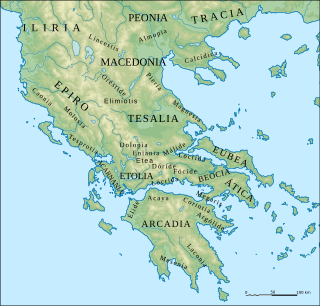Chaonians
ancient Greek tribe that inhabited the region of Epirus From Wikipedia, the free encyclopedia
Remove ads
The Chaonians (Ancient Greek: Χάονες, romanized: Cháones) were an ancient Greek tribe that lived in the region of Epirus that is today part of northwestern Greece and southern Albania.[1][2] It was part of the northwestern group of Greek tribes together with the Molossians and the Thesprotians.[1]

Name
The Greek names "Chaonia" (Χαονία) and "Chaones/Chaonians" (Χάονες) both come from "Chaon" (Χάων, *χαϝ-ών) meaning "place with gorges".[3]
History
The Chaonians are first mentioned by the Greek historian Thucydides in the 5th century BC.[4]
The Greek historian Strabo says that the Chaonians and the Molossians were the most famous tribes of Epirus, because they once ruled all of Epirus.[5]
The Periplus of Pseudo-Scylax refers to the Chaonians as separate from the Illyrians.[6]
The Greek historian Polybius says that the Illyrians raided the Chaonian city of Phoenice in 230 BC.[7] Many Italian traders who were at the city when the raid happened were killed or enslaved resulting in the Roman Republic starting the Illyrian Wars the next year.[7]
Remove ads
Politics and culture

The Chaonians were settled Kata Komas (Ancient Greek: Κατά Κώμας), meaning in a group of villages, and established a tribal state in the 5th century BC.[8]
The Greek historian Thucydides says that their leaders were chosen yearly and names two such leaders: Photius and Nikanor.[9]
They were connected to other Greek tribes in Epirus (Ancient Greek: φυλαί, romanized: phylae) such as the Thesprotians and Molossians.[10] The Chaonians joined the Epirote League, a federation of Greek tribes founded in 325/320 BC that ruled Epirus until the Romans conquered the region in 170 BC.[11]
The Chaonians participated in the ancient Olympic games and festivals where only Greeks were allowed to attend.[2][12][13]
List of Chaonians
- Photius and Nicanor, leaders of the Chaonians in the Peloponnesian War (circa 431–421 BC).
- Doropsos Δόροψος, theorodokos in Epidauros (circa 365 BC).[14]
- Antanor (son of Euthymides), proxenos in Delphi (325–275 BC).[15]
- Peukestos, proxenos in Thyrrheion, Acarnania (3rd century BC) -πητοῦ Χάονα Πευκεστόν, Σωτι-.[16]
- Myrtilos, officer who gave proxeny decree to Boeotian Kallimelos (late 3rd century BC).[17]
- Boiskos (son of Messaneos), prostates (late 3rd century BC)[18] (the Greek word prostates means "ruler"[19]).
- Lykidas (son of Hellinos), prostates (circa 232–168 BC).[20]
- -tos (son of Lysias), winner in Pale (wrestling) Panathenaic Games (194/193 BC).[21]
- Charops, father of Machatas, father of Charops the Younger - philoroman politicians (2nd century BC).[22]
Remove ads
References
Further reading
Wikiwand - on
Seamless Wikipedia browsing. On steroids.
Remove ads
